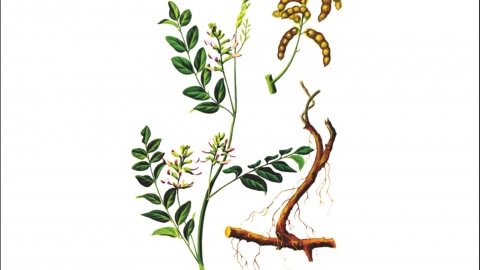What medications are incompatible with Hei Shun Pian?
There are certain contraindications when combining Heishunpian (Black Prepared Slices) with other herbs, generally including incompatible combinations with licorice, seaweed, Euphorbia pekinensis, Genkwa flower, and kansui root. If concerned, it is recommended to consult a healthcare professional in advance. Detailed explanations are as follows:

1. Licorice: Heishunpian is warm in nature and functions to support fire and yang energy, while licorice is neutral and harmonizes various herbs, effectively relieving spasms and pain. These two herbs have opposing properties. The mild and slowing characteristics of licorice may weaken the warming and yang-enhancing effects of Heishunpian, potentially reducing its efficacy or even causing adverse reactions.
2. Seaweed: Seaweed is cold in nature and functions to soften hardness, dissipate nodules, resolve phlegm, and promote diuresis, whereas Heishunpian is warm and used for dispelling cold and restoring yang. The significant contrast in their properties—cold versus warm—may lead to imbalance of yin and yang in the body when used together, causing discomfort or reducing therapeutic effectiveness.
3. Euphorbia pekinensis: Euphorbia pekinensis is cold in nature and primarily used for purging water and eliminating fluid retention, commonly indicated for edema and abdominal distension. Heishunpian, mainly functioning to warm yang and dispel cold, has opposing properties. The strong purgative effect of Euphorbia pekinensis may interfere with the warming and nourishing action of Heishunpian, potentially affecting therapeutic outcomes or causing bodily harm.
4. Genkwa flower: Genkwa flower is cold in nature and primarily functions to purge water, expel fluid retention, detoxify, and kill parasites, while Heishunpian mainly warms and restores yang energy. The cold nature of Genkwa flower clashes with the warm nature of Heishunpian. Combined use may neutralize each other's effects, increase gastrointestinal irritation, and raise the risk of side effects.
5. Kansui root: Kansui root is cold in nature and possesses strong purgative and diuretic effects, commonly used for treating severe edema. Heishunpian, known for its ability to warm and supplement yang energy, has a warm nature incompatible with the cold properties of kansui root. Concurrent use may disrupt the body's internal balance and lead to adverse consequences.
When using Heishunpian, it is essential to strictly follow the guidance of traditional Chinese medicine theory and avoid simultaneous use with the aforementioned herbs. If combination therapy is necessary, consultation with a qualified physician or pharmacist is strongly advised to ensure safe and effective medication use.





